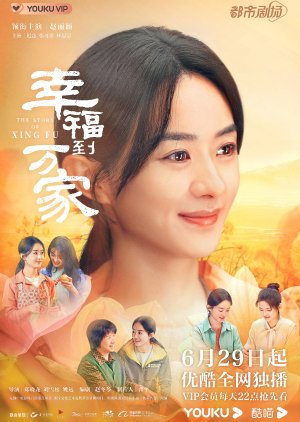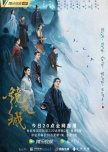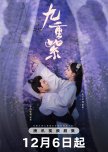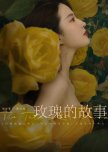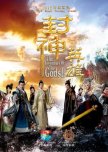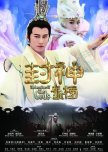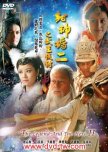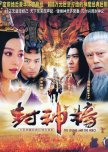
家和万事兴 (Jiā hé wànshì xīng) Prosperity Starts from Harmony at Home
家和万事兴 is a motto that is embedded in every Chinese people’s heart. This philosophical adage reflects in their everyday life and is vividly portrayed in this outstanding story. The Story of Xing Fu is partially adapted from Chen Yuanbin's novella The Wan Family's Lawsuit (万家诉讼) which was also made into a movie in 1992, Qiu Ju’s Lawsuit (The Story of Qiu Ju), directed by the acclaimed Zhang Yimou and acted by the gorgeous Gong Li. The earlier story was set around the 1980s when rural life was harsh, and the country’s economic miracle was still at its infancy.In this new story, The Story of Xing Fu, set in the late 2010s, viewers can see the marked improvement of village life compared to the 80s, but the rural-urban differences are still very distinct with the sophisticated urbanites looking down on the poor villagers; the divide is even more brazen now than the old days.
Xingfu (Zhao Liying) is a rural woman who is strong headed and lives life guided by her uncompromised principles of honor and integrity; right and wrong for her is black and white. Though not well educated, she would go all out to find justice when a person’s right is being infringed, for she is a person who would go all out to help whoever needs help. She is fearless to take on the rich and powerful if she needs to, because she believes the rule of law will always prevail. After she marries to a farmer, Wang Qinglai (Tang Zeng) from a neighboring village, she comes to live in the Wan Family’s Hamlet.
The Wan Family’s Hamlet is a settlement founded and led by Wan Shantang (Liu Wei) as the respected village head. The residents there are mostly Wan Shantang’s relatives with Wan (万) as their family name. Hence, the Wang (王) family, Xingfu’s in-laws, becomes an odd-one-out and feels like an outsider. For this reason, the Wang family always keeps a low profile and tries to please everyone especially Wan Shantang, hoping with the village head on their side, they would blend in more easily.
All disputes by villagers in rural China are usually settled out of court through intermediaries such as the village heads. Local police may be involved as a mediator to bring the disputing parties together to come to a settlement. This drama carefully portrays this side of life for most of the Chinese population (majority of the population still lives in the rural areas and small cities).
Therefore, when Xingfu’s husband was accidentally kicked by Wan Shantang in the groin, she is unhappy with such settlement and files a lawsuit against Wan Shantang, something that is out of the ordinary. As things eventually turn out, Xingfu is indebted to Wan Shantang, and the lawsuit is forgotten. But as everything is going smoothly for all, the law catches up with Wan Shantang and he’s imprisoned. Outraged by her action which is seen as being ungrateful by the villagers, Xingfu and her husband are forced to leave the hamlet to avoid their awkwardness at home and become migrant workers in the city.
Chinese families often sacrifice themselves and send family members who have the most potential to the cities to work or for higher education, in the hope that the ones that ‘make’ it would reciprocate and help take care of the rest of the family. The concept of investing in one person and when the person gets wealthy, he/she would help bring up the rest of the people, permeates the whole society. Wang Qinglai and his family work hard and send Wang Qingzhi (Liu Yanchen), Qinglai’s younger brother, to study and work in the city. When Xingfu and Wang Qinglai come to live in the city, Wang Qingzhi is expected to take care of them.
‘Guanxi’ (connection) and ‘renqing’ (favor) are deeply rooted practices of the Chinese tradition. As the government tries to weed out nepotism and corruption, such practices become prohibited especially in the cities. Wang Qinglai doesn’t realize the pressure and predicament he has put his brother in, as such tradition is viewed undesirably in the city. The drama tries to portray realistically the conflicts between the brothers in the job finding process.
There has been massive rural – urban migration in the last 40 years in China, causing unsustainable pressure in the cities. Rural farms are being deserted, children are growing up without their parents, and elderly parents are being abandoned by their city-bound grown-up children. Wan Shantang tells Xingfu that, though it’s a must to leave the village to see the world sometimes, she must not ever forget where home is. After all, life is meaningless if one loses one’s family. These heart-felt words are meant not only for Xingfu, but for all viewers alike: do not lose your family in the pursuit of wealth and materialism. In the end, you may end up with nothing. Silently the writer is telling the viewers that, wherever we may be living, family is where home is.
In this drama, Zhao Liying is not that glamorous girl. She's a typical village woman with unflattering hairstyle and old-fashioned clothing that is worn by most women in rural China. Her growth after living in the city helps her look more sophisticated later as an inn keeper, but most of all, she becomes more flexible and articulate for the well-being of all the residents of the Wan Family’s Hamlet. Zhao Liying’s portrayal is convincing, bringing alive the Xingfu character who initially has a one-track mind and later develops into a savvy business woman with compassion and understanding. She learns that not everything is as clear cut as in black and white; at times, there are the grey areas and she needs to be flexible enough so that everyone can live in harmony, as it goes, “Prosperity starts from harmony at home” and Wan Family’s Hamlet is home.
I really like the amicable, but straight-shooting Wan Shantang character who is kind and upstanding but occasionally impatient and explosive, and Liu Wei’s portrayal is so wonderful and authentic. Acting as his son Wan Chuanjia, Cao Zeng’s portrayal is equally good and believable.
Luo Jin plays a supporting role here as Guan Tao, the lawyer. As always, Luo Jin exudes an affable demeanor and though he’s not the lead here, his character is well loved, and his chemistry with Zhao Liying is wonderful although their relationship is only platonic. All in all, the whole cast puts in the best of their acting and every character has its flaws, and is realistic and believable.
My Verdict
Just as the brutal treatment of the Tangshan (China) girl’s incident came to the attention of world media recently, the airing of The Story of Xing Fu is timely. The beginning episodes of this drama almost eerily replicate what happened in the Tangshan incident and its handling by the authorities. It is sad to see how many similar cases swept under the carpet, each condoned by the society. There is a lot of injustices, class differences, and gender supremacy, which is an on-going issue, and is not unique only to China; it happens in many societies, including in the open west. I'm glad that Zhao Liying took up this project to bring awareness to the injustices in the rural Chinese society where women are constantly suppressed, discriminated, and wronged.
Director Zheng Xiaolong, who also directed the Legend of Mi Yue, one of my most favorite historical dramas, together with Director Liu Xuesong have brilliantly portrayed the lives of ordinary people in everyday rural China where much of the population lives, bringing out their challenges, ironies, and resignations in facing a changing world. The picturesque scenery of the village is breathtaking. This drama has no romance, no nail-biting plots, no mysteries, just plain slice of life. Many viewers may find it boring, but that's missing the point.
Sacrificing individual’s rights for greater good is touted in the Chinese society; benefits for the community is more important than for personal gains, and this value is repeatedly reflected in this drama. Hence, all conflicts here are being resolved through the concept of “prosperity starts from harmony at home” in mind. It is perhaps such simple value that brings the Chinese societies together, and they become united and great overall for the world to envy. This, is the point of the story.
This drama is for viewers who want to learn more about the real face of China, and for viewers who appreciate the beautiful countryside and its tranquility with a laid-back simple lifestyle.
GREAT WATCH!
Was this review helpful to you?

This review may contain spoilers
Xing Fu, A One Woman Army
This was my first time watching an urban type of drama and I was watching it for ZLY. I wanted to see how she managed in this genre and she was very convincing. The woman is a wonderful actress and I don't think there's a genre out there she can't do. Didn't watch its parent story nor know the source material, so as usual based from a viewer's perspective only.Pros: Every single character was played exceptionally well by their respective actors. Whether you were rooting for them or wanted them to go to prison, each character was complex in their own way. There was no perfect person, everyone had flaws even Xing Fu herself. She was by far the most favorite character. Followed closely by attorney Guan Tao who I know many felt had better chemistry with XF then her husband, the country bumpkin with no spine Qing Lai. I really hope ZLY and LJ get to do a series again together where they play husband and wife; their on screen support of one another was top notch. XF was the one woman army that got things done and she was a very memorable character for that.
I also loved Xi Yue; she had to go through so much stuff and yet progressed beyond and went towards her dreams. Other favorite characters were more on the sidelines, like the other lawyers at the firm with XF and GT, Qing Zhi and his girlfriend. Also old man Wan, though outdated to high hell, still evolved even at his age. All of the villagers that went from clueless to understanding when to fight for their principals.
Now while the Wang parents and Chuanjia, who were my least favorite not just because of the level of nepotism they were used to and how disgustingly they all acted, but I really feel that they all only had some sort of evolution in the last episode. I didn't like QL in the beginning because he was Mr. Nepotism but I do like the fact that they evolved him to be a pretty good supporter of his wife though it took something like 39 episodes to do.
Cons: Chuanjia is a very complex character not just because he's the main antagonist and really believable which I know makes you wonder why he's in the cons, but it's because of just how much he got away with before the very last episode that finally sent him off to prison. The writing I think is where things went south. With him and the other evildoers, instead of having just a few subplots to make the story move along it was like do something immoral, unethical, compensate a ton of money to make the problem go away; rinse, repeat.
The sheer amount of problems went beyond the norm; starting off with the first assault, stealing land, 2nd assault on QL, identity theft, well water pollution, etc. Breaking promises/coverups, spreading harmful rumors, bullying, it was nonstop. It could have been enough to fill many series instead of squeezing them into one and then waiting until episode 40 to rush around cleaning up 2 out of 35 messes. It's like the writer took every worst case scenario and just stuck them together in this.
The rushed ending was a copout, Chuanjia went to prison but XF was sending him books? Like what kind of punishment is that? So moral of the story is no matter how many people you harm or nearly kill (including kids) just say I'm sorry, give a million bucks, bow, and hey it's all hunky dory? Writing got very sloppy here. It shows that even in present times as episode 40 seemed to happen in 2019, justice is hard won and no one really has any actual regard for the law. That was a really big let down for me personally. I just wish they had incorporated the punishment fitting the crime more and more often.
Would I recommend it? Overall it was a decent drama and ZLY absolutely shone in it, so just for that I would. However, be prepared for justice to be served at the very end and not for everything plus very rushed and half-baked; if that doesn't bother you and you don't mind high blood pressure frequently, you'll enjoy this one lol.
Was this review helpful to you?

Recommended for those who appreciate slice of life and don't crave romance
This is one of the genres that I really like, using drama as a mirror to show real life in a country.Watching the Story of Xingfu was like a memory trip to me, back to the early or mid 2010s, when I witnessed such changes in China. But I will let the dust settle its veil on my extensive jianghu roaming throughout the vast country which I visited or lived in for several decades.
The vibe of change has not let down as China, despite still having a vast agricultural part, has now for years slid into a majority urban mode of life. Poverty has been more or less uprooted, as the allocations to the neediest gave a leg up for many to gain access to better opportunities. Chinese people are industrious, and this drama shows some ways they put this attitude to work.
My opinion is that this drama portrays very well the lingering rural / urban divide, together with the opportunities for everyone to change their destiny through education or venturing into business. China's rapidly evolving landscapes and mindscapes are the subject of this drama, as well as the disappearance of utter poverty as was documented by the likes of Wang Bing in movies such as TieXiQu and San ZiMei. This is only hinted to in the wistful reminiscences of the Wan village leader, in the drama, but it is ever present in the memories of all those who lived in the decades leading to the 21st century, and it is useful to understand that China has an increasing part of people reaching retirement : they are living memory but can also be a burden with their different mindset from the new generations who feel shackled by the outdated ways and values such older generations family members still accept.
Old ways must sometimes be firmly opposed, forcing new ways to replace backwards customs, like outlawing the wedding hazing or boorish behavior in the drama, or fighting attacks on women in real life, like the Tangshan, Hebei, BBQ restaurant incident in June, that had the Chinese social media aflame, triggering crackdowns on emerging gang style groups.
Yes, there are still remnants of old ways of doing things, like the relying on family and friends networks for favors or needed support by public like Xingfu seeking approval from village leader Wan, the red envelopes, etc. Village life is often a sort of extended family life in which special rules may apply; the village head is considered as a revered father figure.
With modernity, new challenges appear : environmental concerns, new ways of marketing the products of the land, quality control, especially since the melamine laced milk scandal of 2008 that has left deep scars on the Chinese public's confidence in food and beverages : can mountain streams water be drunk safely ? can fish and produce be free of toxic pollutants?
The regulatory frame is hinted to : today it is so much more aligned with those in developed countries. New laws and regulations have addressed how to tackle the people responsible, with less influence from adverse lobbying than in many other countries. Part of the drama takes place in a law firm, and we see court at work.
But a generation's booming almost lawless development has left traces in groundwater and soils. Shifting from coal based to other energy (wind, solar, nuclear, or imported fuel) is not really seen in this drama that tackles other subjects for concern. Such as hacking and theft of identity. And also the threat of being targeted by the social media rumor mongers, the fearsome 'Water Army' that can orchestrate smear campaigns, difficult to get to the root of and to rectify.
Rumor mongering is severely punished when it is possible to find the authors. Therefore it is especially important that the discontented follow the rules that have been established to get attention from authorities, in order to find solutions. The drama takes the Chinese view on treating problems within the bounds of the tradition that view mediation as often preferable to fighting and going to court ; when it gets there, the sentence can be harsh if there is bloodshed or treason, otherwise the culprit will be sentenced to time that can be spent usefully to redeem and improve themselves through studying. Reform is the objective if the guilty party must return to society. It was already so in 1992 with Qiu Ju and it remains in part true in 2015-2022 with Xingfu.
Actors perform quite well in their sometimes unappealing roles as proposed archetypes or role models. Zhao Liying is a much more beautiful countryside Xingfu than Gong Li's Qiu Ju, and her cheerfulness and courage faced with problems that exceed the family frame, is meant as a good role model for many, but may feel a tad too flawless (ZLY will be again in a leadership role in upcoming Wild Bloom drama next year after two other dramas). Her husband Qinglai, played by Tang Zen, is the epitome of country bumpkins that are the burden which needs to be carried and educated. His sister Xiuyu, played by Lin Siyi, is the model of the downtrodden who must find a way to swallow the heartache and move their destiny upwards nonetheless (She is now playing in a more lighthearted youth romance, Dear Little Mermaid) , Xingfu's sister Xingyun, played by Zhang Keying, is the model of the women who let their profession dampen their moral aspirations, Wan Chuanjia, played by Cao Zeng, has the role of a villain, not the worst, but driven by a weakness of moral character, opposite to his father Wan Shantang, played by Liu Wei, who represents the older, idealistic, generation, who fought to make positive changes around them. The most awaited star (except for Zhao Liying) : LuoJin , appears mostly in the "Xingfu in the city" first part episodes. He plays a pivotal role as Guan Tao the lawyer, and represents what China strives to achieve in law and order.
It is not really useful to dwell on the music. The orchestral theme for the opening of episodes is adequately pleasing to listen to while pictures and sketches roll by. The background music is unobtrusive. The end episode theme song "Happy Flowers" 幸福花朵 sung by Tan/Qin Kexin (覃可心) is a slow ballad.
Despite some expected twists and lengths, it is in my opinion, a very good drama, that presents an interesting image of how China is evolving, centered on domestic country problems, still hoping for a brighter future through the efforts of all.
Would I rewatch ? I have, once, on and off, while being in the thrall of a beautiful ancient History costume drama starring the other Zhao actress and the impressive Wu Lei, so still somewhat distracted from gathering my thoughts about this radically different Story of Xingfu. As in many dramas, the end can feel slightly disappointing or satisfactory, depending on mood and pov.. Overall, I still rate this as excellent in its subgenre.
Was this review helpful to you?
This review may contain spoilers
One of the best in CD drama
As usual, it started with spark and many talking points that successfully attracted many but in the cost of a possibly up coming actress. But thats how this industry works.I always believes in creating a better future. While there are many old cultures and customs that all growing civilization had gone through. It too hundreds of years for many but less than 30 years in China. Its a great achievement.
The FL can really be one of the best person to look up for in terms of her in the drama and in true life (i hope).
Doing what is right with human touch. Trying all the way to make this a better world for herself and others.
Keep going, keep fighting and most of all, keep the believe.
Was this review helpful to you?
This review may contain spoilers
Dreaming Back to the Wan Dynasty (LOL)
Spoiler alert:I started this pilgrimage to Wan Village for Zhao Liying and Luo Jin. Watching the first episode, I was aggravated by the backward thinking and lackadaisical viewpoints of the Wan Village People. "Wedding hazing has been a tradition for generations, and the young people were just having fun", they said. WTF? Wan Village was rife with sycophants, including He Xingfu's MIL Mr. Wang, FIL Mrs. Lin (...Wang), Husband Qinglai, BIL Qingzhi and SIL Xiuyu.
The Wang and the Wans' fate lines were intertwined. The prosperous Wans were poison ivy vines that stifled the Wangs at every twist and turn, so the latter could not catch a break. Emperor Wan Shantang, Crown Prince Wan Chuanjia and Princess Wan Chuanmei abused their privileged status, undermining the Wang family at will. Luckily the middle child Wang Qingzhi had escaped the clutches of the Wans, when he moved to the city to pursue a university education and a subsequent civil service job. The outsider, He Xingfu, became the avenger for the Wang family, demanding justice for wrongdoings, while battling the usual apathy and sycophancy from Mr. and Mrs. Wang, who vacillated in every scene: sometimes sounding intelligent, sometimes sounding stupid. Mr. and Mrs. Wang win Most Sycophantic Stupid Bad Parents Award. He Xingfu wins the Best Daughter-in-Law Award.
Money comes at a price. The Wan business motto was “Rule by Intimidation and Reward the Peasant”. Chuanjia, the golden son, seized the lands that Qinglai and Xingfu were farming, and refused to compensate them for their financial losses. After kicking Qinglai in the balls, Mr Wan agreed to pay him the requested compensation. There were many incidents between the Wangs and the Wans, but the next damning might be Chuanmei's identity theft of her childhood friend Xiuyu. Chuanmei stole Xiuyu's university spot, and continued the masquerade throughout her professional career. Why did Karma take ten years for payback and redemption?
He Xingfu was the justice fighter, taking on new challenges, while her tunnel vision husband, Qinglai, remained stagnant. He was a clone of his parents, who had taken him out of school at a young age, to work on the farm. Uneducated most of his thirty-something years, he would admit to Xingfu that he did not choose this life, and he had no ambition. He never liked farming, but it was the only thing he knew. Mr. and Mrs. Wang slighted him for the prettier second son, Qingzhi, and supported Qingszhi's academic dreams. They looked down on their third child, Xiuyu, and would not support her when she was wronged by Princess Chuanmei. Mr. and Mrs. Wang win Most Callous Stupid Bad Parents Award.
This melodrama drama had family conflicts, social issues and environmental issues. The rich and powerful Wans were regarded as godlike benefactors by the Village People. The Wan's family sheen would tarnish at the end. Chuanjia was sent off to jail for polluting the well water with lead discharged from his wastewater treatment plant. Chuanmei revealed her duplicity in robbing Xiuyu of her academic education and her identity, and made a public apology. Wan Shantang resigned in shame, from his position of Village Leader. Thank you, Karma and Retribution, for finally visiting the Wans, even if it took you forty episodes.
As I predicted, He Xingfu was appointed the new Village Leader. She deserved the job because she was a champion of the people, and her ethics were outstanding. Long live Empress He Xingfu! Qinglai stepped out of his box, and implemented the Village Farm Cooperative.
It is not very often that I feel compelled to write a review of a drama I just watched. I usually retain 20% of the plot, by the time the drama comes to an end. Story of Xingfu was different. I might remember 70% of the plot, because of the realism aspect. Life in a far eastern village is not the same level as life in a small western town.
Was this review helpful to you?

Great Drama with Strong and Smart Female Lead
This is definitely not the usual drama with glamorous looking leads. The story takes place in a small village in China, so everyone dressed accordingly and with minimal make up, no fuss hairstyles.I started this because I'm a fan of Zhao Li Ying and Luo Jin. Watching ep 1, I had my hesitation because I found out Luo Jin is not the main lead (actually he didn't appear until much later episodes, 4 I think and it was very brief) and the small village minded people really annoyed me. But sadly that what really happen in small villages, so what can I say.
Zhao Li Ying's acting was so natural that I couldn't stop watching. And it got better and better, I kept on watching, even though without English subtitles and I don't even understand Mandarin. The subtitle comes at a snail pace. Now we're at episode 20, and subtitles is still at ep 8.
Good news is Luo Jin starts to appear regularly at ep 18/19 because that's when Xing Fu and her husband moved to the city to find work (and accidentally encountered Luo Jin's character who has a small law firm).
Interaction of Luo Jin and Li Ying, even though just working relationship, is so beautiful to watch, I kept watching without knowing what the heck they're saying haha. They're such wonderful actors!!!
I find Xing Fu's husband as the most annoying character. He makes me feel nervous with his stupidity and small village mindset! I also wonder what will happen with Xing Fu's sister.
Was this review helpful to you?

fantastic ensemble cast
Best show I saw in 2022, & not just because the main character has the same last name as me. "A crime doesn't turn into a local custom just because everyone does it" (Ep13). In 2004 a wealthy village chief's son sexually assaults a bridesmaid at a villager's wedding, setting off a chain of events over the next 13 years, unravelling layers of misogyny, corruption, & oppression within not only the judicial system but among family members. The struggles between the individual & the collective is exacerbated in the migration from the village to the city & the march toward modernization. The story follows the bride in her relentless fight for justice for her family & their very own livelihoods. The ensemble cast is fantastic, portraying very complex & intersectional characters with sensitivity & grace.Was this review helpful to you?
This review may contain spoilers
STORY OF XING FU
ZHAO LYING IS ALWAYS A GOOD ACTRESS, I REALLY ENJOY HER ACTING, DEFINITELY, SHE HAS PUT WORK INTO IT. I WOULD RECOMMEND THIS DRAMA TO OTHERS. I HAVE WATCHED OF MANY HER DRAMA. SHE ALWAYS WORKS SO HARD AND IS SINCERE AND A GOOD ACTRESS, HER ACTING IS VERY NATURAL AND CUTE, SOME DRAMA THAT I WATCH FROM OTHER ACTRESSES JUST NOT AS GOOD OR NATURAL AS ZHAO LYING LIKE YANG MI AND DILRABA, BOTH HAVE A PRETTY FACE BUT THEIR ACTING COMPARE TO ZHAO LYING, I WOULD DEFINITELY PICK ZHAO LYING OVER THAT 2 ACTRESS. THIS IS AN HONEST MY HONEST REVIEW.Was this review helpful to you?
Xing Fu, the only main lead
As the title would have already spoilt you, the drama shows Xing Fu marrying into the Wang family in the rural village & where all the story around the evil Wan family unfolds. I love ZLY's character as Xing Fu, she is loyal to the family and does not hesitate to fight for what is right. The drama does brings out a few incidents that the Wan Family deserved harsh punishment but the drama failed to portray that part well & i felt like it was swept under the rug.Xing Fu's character by ZLY is very interesting to watch. She might not be as knowledgeable as her sister but she knows how to adapt to new environment, read the surrounding, treat people with the respect they deserve and is very hardworking. The drama did very well in her character growth. However, her in laws (Wang Family) was hard to watch. Although they did show very well the mentality people from rural places might have but they do not deserve anything Xing Fu have done for them and i don't think they appreciated it as well. XF's husband was a coward and only knows how to whine or how life treated him badly. I honestly have no idea how she survived in that family. XF's sister was different from her, she is able to bend her back for money (i don't blame her completely here) but she shows no gratitude to the people that helped her once she succeeded.
Here comes my favourite part of the show - when Xing Fu works at Guan Tao's new law firm. It was nice to see how XF helped GT and how much she learned there. I am sad that it didn't continue because she chose to goes back to the village in the end. I actually alr knew GT wasn't gonna play a ML role here because the poster only wrote he is a guest role (i know its weird because he appeared in so many scenes).
Overall, the setting of this show is good but given a better direction, it would have ended much better (and also to our satisfaction). It could have been MUCH better to see XF walk out from her toxic in law family and for Wan Family to get a much harsher punishment. But everything was just not that. Nonetheless, i enjoyed this show thanks to Xing Fu and Guan Tao!
Was this review helpful to you?

MIDWAY REVIEW
As a lover of historical dramas, I am always thirsty for contemporary dramas that relate to Chinese culture that is more than the industrialized business sector. I think I watched too much Li Ziqi when she was broadcasting. This drama is well written, has an intense and compelling storyline, and is addictive. Rural village life is portrayed in-depth and in the early episodes important but not pleasant cultural traditions are shared. Also, rural traditions that are almost feudalist and almost remind me of plantation-type lifestyles are revealed and explored. As the drama continues you begin to experience the contrasts of city life versus rural life and how they have intermingled because the next generation is sending their children to schools in cities and their ambitions and values are changing. This drama is worth every viewing minute.Was this review helpful to you?
This review may contain spoilers
If you're tired to watch c-dramas having with same plot, I guess this drama fits you.
Acting-wise and Actors:Zhao Liying as the lead actress, the type of actress who can't deliver heavy emotions that's what I personally think of her but don't get me wrong I don't mean that she can't act at all. In this drama, I find her acting looking natural and totally fits with the "He XingFu" character as if we're watching a real life one. Well at first, I felt that she's too pretty here but as the show goes on and on, you can see her flaws and every episode she just initially convinced me.
The supporting characters are all strong:
Dropping all the c-dramas because of the lackluster acting of its supporting actors but this drama got it all for you. A complete package, from Wan Chuanjia, Wang Youde, Wang Qinglai, Wang Qingzhi, He Xingyun, Wan Chuanmei. These characters pissed me off through the whole run of the drama. It is fortunate to have Guan Tao (Luo Jin) which I think he's a huge ray of sunshine and Wan Shan Tang, a character I can't love and hate both.
In terms of the story:
The conflicts are well-versed as if the drama inspired by a true to life story (My comment for the first 30 episodes). Different story arcs and multiple social issues has been discussed and portrayed here, actually still processing in my head how they were able to squeeze everything in 40 episodes.
A big let down wherein XingFu went back to the Wan Village and by the time she's there the pace of story keeps getting faster and faster, till the issues stays being not resolved. I am not even sure if this type of story deliberately done to displease the viewers and say that fairy tales don't exist. Just as everyone wishing Xingfu to leave Wang Qinglai and the Wang family.
Also adding that the lack of foundation to understand the different characters like where are they coming from. That's all.
Overall:
This show was sort of addicting. We're watching it in a big tv screen here in our house cause its perfect for a night soap opera drama. In the end, we keep saying that huh? what? its already done? Every night we experienced an emotional strain and tension but nothing stops us not to watch this. Exasperating and full of sighs but hell yeah its binge-watchable. Worth to watch!
Was this review helpful to you?
This review may contain spoilers
a show which causes high blood pressure
A nuanced story with excellent acting, this setting will be especially familiar to people growing up in Chinese households. There isn't really a villain in this story except for Wan Chuanjia, but this guy really takes the cake. The pacing imo in the first ~20 episodes is on point (not too fast, introducing the cast slowly), and although Xingfu faced many obstacles, I found the plot well thought out. In terms of Zhao Liying's shows, this is probably the best acting work of hers that I've seen, though her character here is very similar to Minglan.However! The irrational way that the characters except for Xingfu and maybe Guan Tao act might be realistic, but it is really frustrating. The elderly villagers are stuck in another time, most of the time incapable of reasoning and sometimes really disregard human rights. Small problems and defects of character seed thousand dollar lawsuits. The most irritating for me is Wang Qinglai, although his situation is understandable, but he really seems so small-minded and incompetent next to Xingfu. Chuanjia is meant to be careless and detestable, but sometimes Qinglai can surpass him imo.
Unfortunately, as the show progressed past ep ~30 a few kind of unrealistic plot points were implemented including Wan Chuanmei's story. The Wan family children are really the root of evil in this series, what they did is really too unjust, they almost become 2d villains. However that's not to say some of the side stories have no flavor, for example I found Qingzhi's difficult relationship with his father in law to be relatable and well depicted.
Was this review helpful to you?

 1
1